The drive to give more Nigerians affordable housing may not be feasible if government fails to regulate the increasing cost of building materials and the dependent of the builders on foreign materials going by the views of some Nigerians.
Most Nigerians who spoke to The Sun Newspaper on the increasing cost of building materials are of the opinion that most policy makers are viable and can afford any standard of building notwithstanding the cost and maintenance, so will not legislate on it. The President, Building Collapse Prevention Guild (BCPG), Mr Sulaimon Yusuf, believes that the moment the cost of building materials drops and government make land available for developers, there will be much buildings for Nigerians. He said that when there are more houses than the people looking to acquire them, the prices will reduce. This is in line with the economic theory that when supply is more than demand price drops.

Another respondent, Chief Meckson Innocent Okoro (MI OKORO), said that the high cost of construction is due to a number of factors that include high cost of labour, the high cost of raw materials, and the high cost of land. The high cost of construction is also due to the low productivity of the construction sector, which results in higher costs per unit of output. The high cost of construction is a major constraint on the development of the Nigerian economy. Furthermore, this issue has led to an increase in mortgage fraud as well as increased economic inequality. Consequently, there are some policies that can be adopted by policymakers that would help mitigate the negative effects of the high cost of construction.
READ ALSO:Operators on the lookout for the rental model as a solution to affordable housing
“One such policy would be for policymakers to invest more heavily in constructing more affordable housing units through an investment-led approach, which would involve borrowing money at cheaper rates than the rates at which it lends to private developers. Another solution would be for policymakers to cut down the power tariffs charged by state governments. Another solution is for policymakers to adopt sound economic policies such as expansionary monetary policy and fiscal consolidation, which will lead to lower interest rates on loans from commercial banks. For instance, we don’t want to build a house that is expensive and difficult to maintain. Our intention is to meet the requirement of the Constitution, which is right to shelter for every Nigerian,’’ he said.

In the words of Mr. Mike Ekwemalor, a property developer in Anambra State, the cost of building materials in Nigeria has been a topic of concern for many years, as it directly affects the affordability and accessibility of housing for the average Nigerian. “In recent times, the cost of building materials has increased significantly, causing a ripple effect in the real estate industry. There are several factors that contribute to the high cost of building materials in Nigeria, including inflation, foreign exchange rates, transportation costs, and government policies. The COVID-19 pandemic has also had a significant impact on the cost of building materials, as it disrupted global supply chains and caused a shortage of raw materials and it hasn’t recovered up till now. The high cost of building materials has led to a decrease in demand for housing, as many Nigerians cannot afford to build or buy homes. This has had a negative impact on the real estate industry, which is a critical sector of the Nigerian economy. The government has taken some steps to address the high cost of building materials, including reducing the cost of import duties on some materials and increasing local production. However, more needs to be done to make building materials more affordable and accessible to Nigerians,”he noted.




